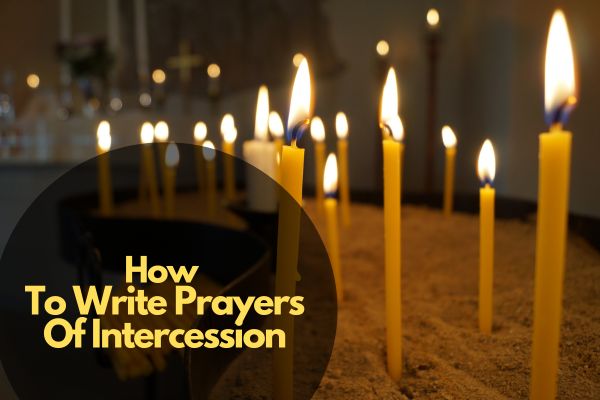Intercessory prayer is a powerful and compassionate act of seeking God’s intervention on behalf of others. It is a way to stand in the gap for those who are in need, whether they are facing challenges, illness, or seeking spiritual guidance. Writing intercessory prayers is an art that requires heartfelt intention, faith, and a deep connection with the Divine. In this guide, we will explore how to write prayers of intercession, step by step.
How To Write Prayers Of Intercession
Intercessory prayer holds a unique place in the realm of spiritual practices. It is an act of selflessness and empathy, where individuals pray for the well-being, healing, and guidance of others. Intercessors act as mediators between the person in need and the divine source of comfort and guidance. The power of intercession lies in its ability to bring about positive change in the lives of those for whom we pray.
Understanding Intercessory Prayer
What is Intercession?
Intercession, in the context of prayer, is the act of petitioning or pleading with a higher power, usually God, on behalf of others. It goes beyond personal supplication and extends to the needs and concerns of friends, family members, communities, and even strangers.
The Role of an Intercessor
An intercessor is someone who takes on the responsibility of standing in the gap between those in need and the divine. They are advocates for the well-being of others, offering prayers, empathy, and support. Intercessors are often driven by compassion and a desire to see positive change in the lives of those they pray for.
Preparing Yourself for Intercession
Cultivating a Heart of Compassion
Intercessory prayer begins with a compassionate heart. To effectively intercede for others, one must cultivate empathy and genuine concern for their well-being. A compassionate heart is open to the pain and struggles of others and desires to alleviate their suffering through prayer.
Seeking Spiritual Guidance
Before embarking on intercession, seek spiritual guidance and discernment. Spend time in prayer and reflection, asking for wisdom and insight on how to pray for specific needs. Connecting with your spiritual community or a mentor can provide valuable guidance.
Identifying the Needs
Recognizing the Individuals or Situations Requiring Prayer
Identify the people or situations that you feel compelled to intercede for. It could be a friend battling an illness, a family member facing a crisis, or global issues that weigh heavily on your heart. Identifying the specific needs is the first step toward effective intercession.
Specificity in Intercession
When writing intercessory prayers, be specific about the needs and desires you are lifting up. Specific prayers are often more focused and impactful. For example, instead of a general prayer for healing, you might pray for the complete recovery of a friend from a specific illness.
Crafting Your Intercessory Prayer
The Structure of an Intercessory Prayer
Intercessory prayers typically follow a structure:
Addressing God: Begin by addressing God with reverence and gratitude.
Identification: Identify the person or situation you are interceding for.
Petition: Make your request known to God, presenting the specific needs.
Thanksgiving: Express gratitude for God’s love and willingness to hear your prayer.
Closing: Conclude the prayer with faith and trust in God’s divine plan.
Choosing Words with Care
Select your words carefully, aiming for clarity, sincerity, and authenticity. Use language that resonates with your heart and reflects the urgency and depth of your intercession.
Incorporating Biblical Principles
Intercessory prayers can be enriched by incorporating biblical principles and verses that align with the needs you are presenting. Scripture provides guidance and comfort in intercession.
Bible Verses on Intercession
The Bible contains several verses that emphasize the importance and power of intercessory prayer. Here are some Bible verses on intercession:
1. Romans 8:26-27 (NIV)
“In the same way, the Spirit helps us in our weakness. We do not know what we ought to pray for, but the Spirit himself intercedes for us through wordless groans. And he who searches our hearts knows the mind of the Spirit because the Spirit intercedes for God’s people in accordance with the will of God.”
2. 1 Timothy 2:1 (NIV)
“I urge, then, first of all, that petitions, prayers, intercession, and thanksgiving be made for all people.”
3. James 5:16 (NIV)
“Therefore confess your sins to each other and pray for each other so that you may be healed. The prayer of a righteous person is powerful and effective.”
4. Colossians 1:9-10 (NIV)
“For this reason, since the day we heard about you, we have not stopped praying for you. We continually ask God to fill you with the knowledge of his will through all the wisdom and understanding that the Spirit gives, so that you may live a life worthy of the Lord and please him in every way: bearing fruit in every good work, growing in the knowledge of God.”
5. Ezekiel 22:30 (NIV)
“I looked for someone among them who would build up the wall and stand before me in the gap on behalf of the land so I would not have to destroy it, but I found no one.”
6. 1 Samuel 12:23 (NIV)
“As for me, far be it from me that I should sin against the Lord by failing to pray for you. And I will teach you the way that is good and right.”
7. Job 42:10 (NIV)
“After Job had prayed for his friends, the Lord restored his fortunes and gave him twice as much as he had before.”
8. Isaiah 59:16 (NIV)
“He saw that there was no one, he was appalled that there was no one to intervene; so his own arm achieved salvation for him, and his own righteousness sustained him.”
Offering Your Intercession
The Act of Prayer
The act of prayer is where intercession comes to life. Set aside dedicated time to pray for those you’ve identified. Pray with sincerity, passion, and faith, believing that your prayers can bring about positive change.
Persistence and Consistency
Intercessory prayer is often a journey, and persistence is key. Continue to intercede for others regularly, even when you don’t see immediate results. Consistency in prayer demonstrates your commitment and faith.
Understanding Biblical Examples
The Intercessory Prayers of Moses, Abraham, and Jesus
Exploring biblical examples of intercessory prayers can provide valuable insights into this practice. The prayers of Moses for the Israelites, Abraham for Sodom and Gomorrah, and Jesus for His disciples are powerful examples of intercession.
The Power of Faith
Belief in the power of intercessory prayer is fundamental. Have faith that your prayers can make a difference. Trust in God’s wisdom and timing, even when answers may not come as expected.
Conclusion
In conclusion, intercessory prayer is a profound act of love, empathy, and faith. It allows us to partner with the divine in seeking positive change and transformation in the lives of others. Through understanding, preparation, and heartfelt prayer, we can become effective intercessors, making a meaningful impact on the world.
As you embark on your journey of intercession, remember that your prayers are a source of hope and comfort for those in need. Stay persistent, be compassionate, and trust in the power of prayer to bring about positive change.
FAQs on Intercessory Prayer
1. What is the significance of intercessory prayer?
Intercessory prayer allows us to seek God’s intervention on behalf of others, offering support, healing, and guidance.
2. How can I become an effective intercessor?
Effective intercession begins with cultivating a compassionate heart and seeking spiritual guidance. Specificity in prayer and persistence are also essential.
3. Are there biblical examples of intercessory prayer?
Yes, biblical figures like Moses, Abraham, and Jesus engaged in intercessory prayer, demonstrating its power and importance.







